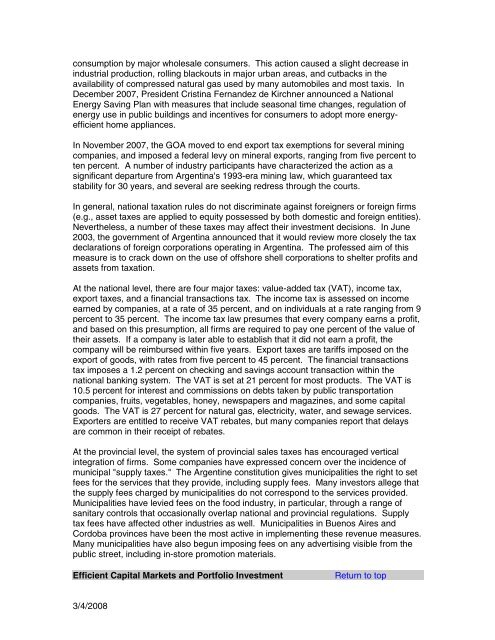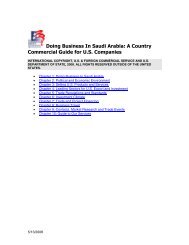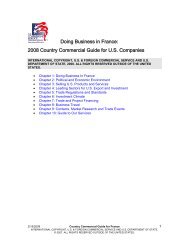Create successful ePaper yourself
Turn your PDF publications into a flip-book with our unique Google optimized e-Paper software.
consumption by major wholesale consumers. This action caused a slight decrease in<br />
industrial production, rolling blackouts in major urban areas, and cutbacks in the<br />
availability of compressed natural gas used by many automobiles and most taxis. <strong>In</strong><br />
December 2007, President Cristina Fernandez de Kirchner announced a National<br />
Energy Saving Plan with measures that include seasonal time changes, regulation of<br />
energy use in public buildings and incentives for consumers to adopt more energyefficient<br />
home appliances.<br />
<strong>In</strong> November 2007, the GOA moved to end export tax exemptions for several mining<br />
companies, and imposed a federal levy on mineral exports, ranging from five percent to<br />
ten percent. A number of industry participants have characterized the action as a<br />
significant departure from <strong>Argentina</strong>'s 1993-era mining law, which guaranteed tax<br />
stability for 30 years, and several are seeking redress through the courts.<br />
<strong>In</strong> general, national taxation rules do not discriminate against foreigners or foreign firms<br />
(e.g., asset taxes are applied to equity possessed by both domestic and foreign entities).<br />
Nevertheless, a number of these taxes may affect their investment decisions. <strong>In</strong> June<br />
2003, the government of <strong>Argentina</strong> announced that it would review more closely the tax<br />
declarations of foreign corporations operating in <strong>Argentina</strong>. The professed aim of this<br />
measure is to crack down on the use of offshore shell corporations to shelter profits and<br />
assets from taxation.<br />
At the national level, there are four major taxes: value-added tax (VAT), income tax,<br />
export taxes, and a financial transactions tax. The income tax is assessed on income<br />
earned by companies, at a rate of 35 percent, and on individuals at a rate ranging from 9<br />
percent to 35 percent. The income tax law presumes that every company earns a profit,<br />
and based on this presumption, all firms are required to pay one percent of the value of<br />
their assets. If a company is later able to establish that it did not earn a profit, the<br />
company will be reimbursed within five years. Export taxes are tariffs imposed on the<br />
export of goods, with rates from five percent to 45 percent. The financial transactions<br />
tax imposes a 1.2 percent on checking and savings account transaction within the<br />
national banking system. The VAT is set at 21 percent for most products. The VAT is<br />
10.5 percent for interest and commissions on debts taken by public transportation<br />
companies, fruits, vegetables, honey, newspapers and magazines, and some capital<br />
goods. The VAT is 27 percent for natural gas, electricity, water, and sewage services.<br />
Exporters are entitled to receive VAT rebates, but many companies report that delays<br />
are common in their receipt of rebates.<br />
At the provincial level, the system of provincial sales taxes has encouraged vertical<br />
integration of firms. Some companies have expressed concern over the incidence of<br />
municipal "supply taxes." The Argentine constitution gives municipalities the right to set<br />
fees for the services that they provide, including supply fees. Many investors allege that<br />
the supply fees charged by municipalities do not correspond to the services provided.<br />
Municipalities have levied fees on the food industry, in particular, through a range of<br />
sanitary controls that occasionally overlap national and provincial regulations. Supply<br />
tax fees have affected other industries as well. Municipalities in Buenos Aires and<br />
Cordoba provinces have been the most active in implementing these revenue measures.<br />
Many municipalities have also begun imposing fees on any advertising visible from the<br />
public street, including in-store promotion materials.<br />
Efficient Capital Markets and Portfolio <strong>In</strong>vestment Return to top<br />
3/4/2008












